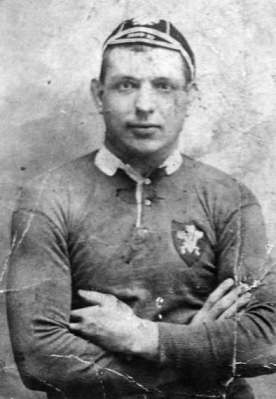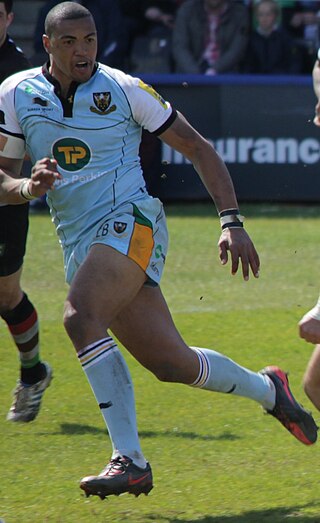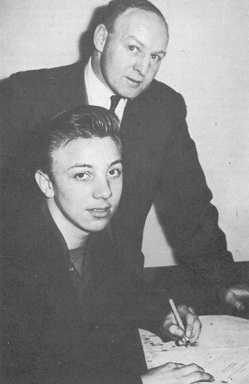Related Research Articles
David Watkins was a Welsh dual-code rugby international, having played both rugby union and rugby league football for both codes' national teams between 1963 and 1974. He captained the British and Irish Lions rugby union side, and made six appearances for the Great Britain rugby league team. With the Wales national rugby league team he played in every match of the 1975 World Cup, and with English club Salford he played more than 400 games over 12 seasons.

Iestyn Rhys Harris, also known by the nickname of "Welsh Wizard", is a former dual-code international professional rugby league and rugby union footballer who played in the 1990s and 2000s, and coach in rugby league in the 2000s and 2010s. He played representative rugby league for Great Britain and Wales, and at club level for the Warrington Wolves, the Leeds Rhinos (captain) where he won the 1998 Man of Steel Award, the Bradford Bulls (captain), and Featherstone Rovers, and representative rugby union for Wales, and at club level for Cardiff RFC and Cardiff Blues, and has coached representative rugby league for Wales, and at club level for Featherstone Rovers, the Crusaders Rugby League, the Wigan Warriors, and Salford Red Devils.

Adrian Paul Morley is an English former professional rugby league footballer who played as a prop or second-row forward. With a reputation as a tough, uncompromising competitor, Morley was the first British player to become a Grand Final winner in both the National Rugby League and Super League.
Allan Glen Bateman is a Welsh former rugby union and rugby league footballer who played in the 1980s, 1990s and 2000s. He is a dual-code rugby international centre who represented the British and Irish Lions at rugby union, and Great Britain at rugby league.
John Charles Bevan is a Welsh international rugby footballer of the 1970s and 1980s. He is one of two John Bevans who played for Wales during the 1970s.
Salesi Finau is a Tongan former rugby footballer. He represented Tonga in both the rugby league and rugby union sides.
Michael Nicholas is the President of Wales Rugby League. He is a Welsh former rugby union and professional rugby league footballer who played in the 1970s and 1980s, and has coached or been the team manager of the Wales Rugby League team since the 1980s. He played club level rugby union (RU) for Aberavon. In rugby league (RL) he played for Warrington, and the Cardiff Blue Dragons, and at representative Rugby League level for Wales and Great Britain. He played as a prop or second row forward.

Kevin Stewart Ellis is a Welsh former professional rugby league and rugby union footballer who played in the 1980s, 1990s and 2000s. A Great Britain and Wales national representative. He played club level rugby union (RU) for Bridgend RFC, Maesteg RFC, Treorchy RFC, Sale Sharks, London Irish, Cardiff RFC, Pontypool RFC and Ebbw Vale RFC, at representative level rugby league (RL) for Wales, and at club level for Warrington Wolves, Workington Town, Gold Coast Chargers, Bridgend Blue Bulls and Celtic Crusaders, as a stand-off, scrum-half, or loose forward.
Maurice Charles Rees Richards is a Welsh former dual-code international rugby footballer. A wing, he was part of the 1968 British Lions tour to South Africa. His grandfather had been a professional footballer with Charlton Athletic and Bradford City in the 1920s.
John Mantle was a Welsh dual-code international rugby player. He was capped for Wales at rugby union, and Great Britain and Wales in rugby league.
Colin J. Dixon was a Welsh rugby league footballer who played in the 1960s, 1970s and 1980s, and coached in the 1970s. He played club level rugby union (RU) for Cardiff International Athletic Club, and representative level rugby league (RL) for Great Britain and Wales, and at club level for Halifax (captain), Salford and Hull Kingston Rovers. He played as a centre, second-row or loose forward, and coached club level rugby league (RL) for Salford, and is a Halifax Hall of Fame Inductee.
Keith John Fielding is an English dual-code international rugby union, and professional rugby league footballer who played in the 1960s, 1970s and 1980s as a winger. He played representative level rugby union for England, and at club level for Moseley Rugby Football Club before switching to rugby league in 1973, and went on to play representative level rugby league for Great Britain and England, and at club level for Salford.
John Denis Gray is an English cricketer, rugby union and professional rugby league footballer who played in the 1970s and 1980s. He played cricket for Warwickshire and Marylebone Cricket Club, as a left-hand bat, and right-arm medium-fast bowler, playing representative rugby union (RU) for England (7s), and at club level for Coventry R.F.C., as a Hooker and representative rugby league (RL) for Great Britain and England, and at club level for Wigan, North Sydney Bears and Manly-Warringah Sea Eagles as a round the corner style goal-kicking prop, hooker, second-row or loose forward during the era of contested scrums.

Francis John Shugars was a Welsh rugby union, and professional rugby league footballer who played in the 1900s and 1910s. He played club level rugby union (RU) for Penygraig RFC, and representative level rugby league (RL) for Great Britain, Wales and Lancashire, and at club level for Warrington, as a forward.
Glyndwr Shaw was a Welsh dual-code international rugby union, and rugby league footballer who played in the 1970s and 1980s. He played representative level rugby union (RU) for Wales, and at club level for Neath RFC, as a prop and representative level rugby league (RL) for Great Britain and Wales, and at club level for Widnes, Wigan, Warrington and Rochdale Hornets, as a prop, or second-row.
William Arthur Williams was a Welsh dual-code international rugby union, and professional rugby league footballer who played in the 1920s and 1930s. He played representative level rugby union (RU) for Wales, and at club level for Crumlin and Cross Keys as a flanker, and representative level rugby league (RL) for Great Britain and Wales, and at club level for Salford (captain), as a prop, or second-row, i.e. number 8 or 10, or, 11 or 12, during the era of contested scrums.

Luther Burrell is a professional rugby union footballer who last played as a centre for the Newcastle Falcons in the Premiership Rugby.

John Parry-Gordon was an English professional rugby league footballer who played in the 1960s, 1970s and 1980s. He played at representative level for England and Lancashire, and at club level for Warrington, as a scrum-half.

Glyndwr Turner is a Welsh former rugby union footballer who played scrum-half i.e. number 9 position for Welsh club side Ebbw Vale RFC between 1966 and 1974 before turning professional to play rugby league in England. On turning professional Turner signed for Hull Kingston Rovers in 1974 playing for them until 1978, before moving to rivals Hull F.C. in 1978 where he played until he was forced to retire in 1980 due to injury, as a centre or stand-off, i.e. number 3 or 4, or 6.
Robert Wanbon was a Welsh dual-code international rugby union and professional rugby league footballer who played in the 1960s and 1970s. He played representative level rugby union (RU) for Wales, and at club level for Aberavon RFC, as a number eight, and representative level rugby league (RL) for Wales, and at club level for St. Helens and Warrington, as a prop, or second-row, i.e. number 8 or 10, or, 11 or 12, during the era of contested scrums.
References
- ↑ "Flight nearly ended his career". Manchester Evening News . 12 October 1972.
- ↑ "England Bring In Smith To Make It A 15-Man Game". The Daily Telegraph . 6 November 1973.
- ↑ "Dave Roughley takes over president's role". Warrington Guardian . 9 May 2002.